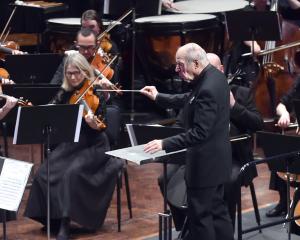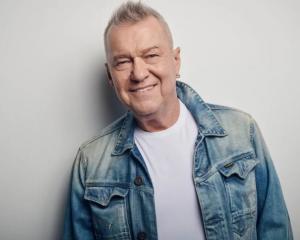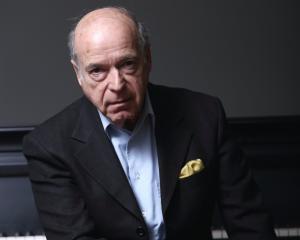"I think I was one of those kids that never outgrew the dinosaur fascination," she said in an interview from Hong Kong. Perhaps not surprisingly, she has had a succession of pet iguanas, and named her recording company, Ancalagon (a dragon from J.R.R.Tolkien's The Lord of the Rings), after one of them.
"Ancalagon died when he was about 5. I was heartbroken, but I was travelling a lot at the time, so that's why I named my company after him," she said.
The New York-based violinist, described as a "high-powered soloist" by The New York Times, is on a 100-day tour to Singapore, Australia and New Zealand and plays with the Southern Sinfonia with principal guest conductor Werner Andreas Albert in Dunedin on Saturday and Sunday.
A second concert has been scheduled on Saturday at 5pm as the original Sunday afternoon one was booked out. It was the third time a second concert had to be scheduled because of demand for tickets, according to Philippa Harris of the Southern Sinfonia.
Born in Canada in 1971, Lara St John started learning the violin at the age of 2 because she was jealous of her brother, Scott, who was also learning the instrument.
Both have made music their profession - Scott is a member of the St Lawrence String Quartet at Stanford University, California. For siblings to reach such a level without parents who were musicians was unheard of , she said (their mother was self-admittedly a pretty mediocre pianist).
She no longer practises for hours each day as she once did. She plays 70-100 concerts a year as well as for recordings on her Ancalagon label.
"Now there's so much playing and I have a pretty large repertoire and a lot of stuff I've done before. If I had to practise for hours a day I'd be mad by now."
She will look over a familiar piece a couple of days before rehearsing with an orchestra, but may spend a couple of weeks revising a piece she has played less often or not for a long time, she says.
"I have a strange memory. Things go in and they don't come out. I have no idea how that happens or why, but it's the way it is.
"It's almost a muscle memory thing. Some pieces really stick in your fingers. The Tchaikovsky [violin concerto] is one and The Four Seasons is another, but there are others like the Shostakovich and Korngold which I have to remind myself every time exactly how they go."
However, she says she is constantly learning, listening and trying new things.
"Things work 60% of the time so there's 40% of stuff I'm like rolling my eyes and going `OK, so we're not going to do that again'."
She believes everything in the performance should be thought out and done for a reason.
"It's very rare I do something in a piece and I don't have some sort of steadfast reason behind it, even just a crescendo or why am I doing this tempo - that kind of thing," she said.
"There are so many traditions, especially in violin, that were born of the late 19th and early 20th century romantic era. A lot of that is good and valid, but a lot is before we had the manuscripts or before we knew anything about performance practice and so on.
"If I'm doing something, especially in Bach or early music, that isn't actually on the page, I think 'why am I doing this - wait wait wait - what's the reason?' And sometimes I catch myself - because I've heard it this way or whatever - doing something that actually makes no sense. It has to make sense," she said.
"I think people aren't taught that much to think for themselves and to realise why you are doing things a certain way. I end up in [master] classes jumping up and down and yelling when I hear `Oh, I'm doing it because my teacher told me to'."
St John likes to play many different types of music besides classical and contemporary concertos and sonatas. She has played with a jazz pianist and has a strong interest in eastern European folk and gypsy music, which she has collected since she was a child.
In 1988 she was an exchange student at the Moscow Conservatory but, with the decline of the Soviet Union, the teachers defected and students were dismissed. She took the opportunity to travel through eastern Europe.
"It was an amazing year. I learned tons. It was an incredible time to be there - the calm before the storm and it would never be like that again."
In New York she has established a polka band, Polkastra, whose debut album Apolkalypse Now she produced on her Ancalagon label. When she gets back to New York they plan to record a wedding album.
"We decided that weddings are one place where everybody still dances, and how much fun it would be - and how completely ridiculous - to do things like Pachelbel's Canon with contrabassoon and a hilarious arrangement. We found our biggest fans were classical musicians who needed a really good belly laugh," she said.
"Everyone's had their share of playing at weddings. It's one traditional place where you do get a lot of classical music and people do dance, and we thought the combination of those things was quite precious."
She established her recording company and label in 1999 because she wanted to have control over what she recorded and has now a team of experts, from engineers to designers, to call on when they decided to do a new CD. She produces SACD (super-audio CDs) which have better quality sound reproduction, especially in surround sound, she said.
"I've had some experience with labels prior - enough to know it's very important, especially in choice of repertoire, that I be in complete control. I know what I do best."
Her recordings include four of works by Bach, and one which features Vivaldi's The Four Seasons and The Four Seasons of Buenos Aires by Argentinian composer Astor Piazzolla, performed with the Simon Bolivar Youth Orchestra of Venezuela.
She is proud her latest recording, Mozart: Sinfonia Concertante for Violin and Viola; Violin Concertos Nos 1 & 3 - in which she and her brother performed with The Knights, a New York chamber orchestra - won a Juno award in Canada, the equivalent of the Grammys in the US.
It was the first time an independent, artist-owned recording company had done so, she said.
Hear her
• Lara St John will perform Vivaldi's The Four Seasons with the Southern Sinfonia, conducted by Werner Andreas Albert, on Saturday, May 7 at 5.30pm and Sunday, May 8 at 3pm in the King's and Queen's Performing Arts Centre. Dougal Stevenson will read The Four Seasons sonnets, thought by some to have been written by Vivaldi himself, before each of the Spring, Summer, Autumn and Winter concertos. The concert also features Arvo Part's Festina Lente and Schubert's Symphony No 8: Unfinished.
•Some of Lara St John's CDs will be available for purchase at the concert and she will autograph them. Otherwise, they are available through Amazon or iTunes.












